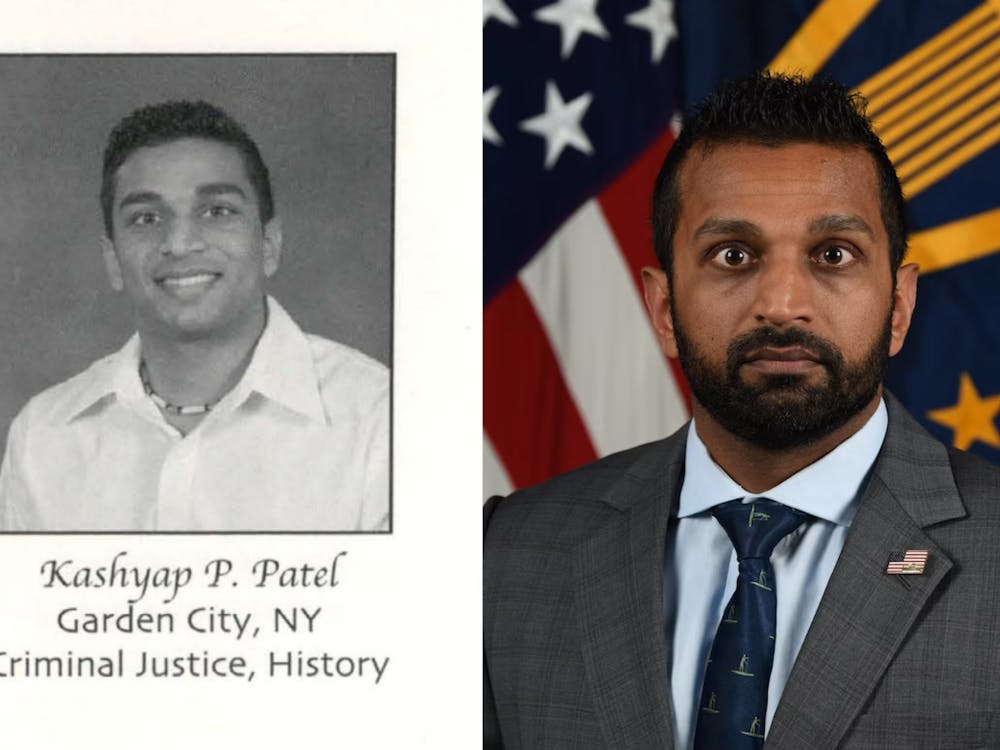“Westhampton College,” the college’s webpage reads, “is the college for undergraduate women at the University of Richmond.”
“Richmond College,” the college’s webpage reads, “is the coordinate college for undergraduate men at the University of Richmond.”
But what if you couldn’t choose? What if you didn’t identify as a man or a woman?
Miranda Rosenblum doesn’t.
“Our system is set up so you have to choose,” they said.
And where does that leave students like Rosenblum, who don’t identify on either end of the spectrum, or who have transitioned to a new identity?
“I would say that leaves them disenfranchised,” Rosenblum said. “It leaves them without a structure that recognizes them at all.”
Rosenblum’s concern is nothing new. In March 2012, the university held a “forum on the Forum” to discuss the coordinate college system. “One of the most intriguing topics brought up,” Collegian reporter David Weissman wrote, “was the possible need for a third college coordinate option.” Participants in the forum had hoped that they would encourage not only a conversation, but action on the issue of gender-nonconforming students. Almost four years later, students like Rosenblum say that a solution has not been found.
Diana Reighart agrees with Rosenblum’s concerns. They identify as gender-nonconforming and queer, and they aren’t quite sure where they belong on this campus. The terms “gender-nonconforming” and “non-binary” refer to gender identities that are not exclusively masculine or feminine. People with these identities often prefer the pronoun “they" as opposed to “he” or “she.”
“A coordinate college system sets up a hierarchy where cisgender people (people whose gender identity matches their assigned sex at birth) are at the top and gender non-binary people are on the bottom,” Reighart said. “They clearly ascribe female to be Westhampton College and male to be Richmond College, and that’s not how this works. Our school basically doesn’t know what the hell it’s doing.”
Richmond College Dean Boehman disagreed with Reighart.
“I don’t think that the coordinate colleges reinforce a dichotomy, but I believe some members of our community have a perception about the colleges that perpetuates an old way of thinking about the colleges, one that frankly predates me in this role,” he said. “If you look at how we talk about the many ways to express masculinity, which is a gender identity, and our work with Westhampton and Common Ground to ensure a place for every student here, I believe that demonstrates that we support gender identity and expression in a very inclusive manner.”
Enjoy what you're reading?
Signup for our newsletter
Students who are not comfortable with their designated coordinate college can switch to the other, Boehman said. But Rosenblum said that was not a sufficient solution. The process of switching, they said, put the burden on transgender and non-binary students.
“That really sucks,” Rosenblum said. “That’s making this an unwelcome place for anyone who doesn’t feel attached to the gender they were assigned at birth.”
The housing system was not designed for transgender and non-binary students, Reighart said. These students, when seeking special housing accommodations — as Reighart did last year, to no avail — are referred to Common Ground, where Reighart said students are analyzed based on their levels of “trans-ness,” before being relegated to singles, where they are unable to integrate into the larger campus community.
Ted Lewis, the associate director of Common Ground, said that they knew of approximately 20 transgender and non-binary students on campus. Lewis, who also identifies as gender non-binary, said that while the university still had progress to make in reforming the housing system, it had come a long way in the last 15 years. It had taken until 2001 for the university to allow men and women to live on the same side of the lake, they said.
Nonetheless, Lewis admitted that work needed to be done to ensure students were comfortable sharing facilities and living with transgender and non-binary students — an issue that is currently in the news in Gloucester County, Virginia, where a transgender teen is suing for the right to use the boys’ bathroom, as opposed to a “gender-neutral” alternative. In the Weinstein Center, a “universal” bathroom and locker room is available, but Lewis said that transgender and gender-nonconforming students could use the bathroom of the gender with which they identify.
Such arrangements often cause discomfort, Lewis said, pointing to a bill being considered by the Virginia legislature, which Lewis said capitalized on the fear that transgender people are sexual deviants.
“This is the language I would never use, but I’ve heard legislators use ‘the man in the dress’ going into the women’s bathroom,” Lewis said.
In terms of housing, Lewis said that the university was working to develop a gender-neutral option within the framework of the current system. The goal, they said, was to rework things slightly differently, not necessarily to make radical alterations.
University President Ronald Crutcher echoed Lewis’ sentiment. He has been considering the needs of transgender and gender-nonconforming students in recent days, after a student in his mentorship program complained that females were spending time with Betty Crutcher while males spent time with her husband.
“You know, the fact that it reinforces the binary, to be honest with you, while I’m fully aware that there are more and more transgender students on campus and we need to do something, we did not do that intentionally,” Crutcher said.
On a broader scale, the school is in a strategic planning process, and accommodations for transgender and gender-nonconforming students will be a part of it, but he said the coordinate colleges were an important part of the university.
“In my estimation, the coordinate system presents the best of all possible worlds,” Crutcher said. “I think it provides opportunities for women in terms of leadership development that are unprecedented that they would not receive if they were in a totally coeducational system. I think it’s valuable for men, to learn about what masculinity means in the 21st century. I understand that for transgender students, that can be a problem, but I don’t know how to address that yet.”
Westhampton College Government Association President Olivia Karahan agreed with Crutcher that the coordinate colleges allowed female students — herself included — opportunities they would not normally have. She said the school was making strides in all but one area.
“Housing is the one area that we haven’t really touched,” she said. “Gender-neutral housing? I support the idea of looking into it.”
Housing has to be reformed to allow more flexibility for students like Reighart to live with the people with whom they are most comfortable, Crutcher said.
But Reighart said they had a hard time living in a space that wasn’t welcoming.
“We even lack space for being a tomboy somewhat,” Reighart said. “Unless you’re an athlete on a team or something like that, or around other sporty women, it’s not really a part of the Westhampton woman. You get to a point, you definitely go through, you get so tired of it. I still get tired of it.”
Boehman said the university was successfully promoting an inclusive environment, and he encouraged anyone who felt otherwise to speak with him.
“I am happy to have that conversation,” he said.
But Rosenblum sees this question in a larger conflict. In spite of all the promises of conversations and strategic planning processes, they said, this isn’t an issue that emerged from a vacuum.
“We’ve been having a conversation for 100 years,” they said. “Now it’s time to finally do something about it.”
Editor’s Notes: RCSGA President Angelo Suggs's schedule did not allow him to speak for the story before deadline. Westhampton College Dean Kerry Fankhauser, who just returned from medical leave, was unavailable for an interview.
Contact reporter Damian Hondares at damian.hondares@richmond.edu
Support independent student media
You can make a tax-deductible donation by clicking the button below, which takes you to our secure PayPal account. The page is set up to receive contributions in whatever amount you designate. We look forward to using the money we raise to further our mission of providing honest and accurate information to students, faculty, staff, alumni and others in the general public.
Donate Now



